Religions for Peace Hosts Necessary Conversation on Engaging Youth on Countering Racism
Religions for Peace, the Islamic Cooperation Youth Forum (ICYF), and the International Islamic Fiqh Academy (IIFA) co-organised a side event, Engaging Youth in the Abolition of All Forms of Racism from a Faith Perspective to Achieve a Sustainable Future for All, on 21 September 2023, on the margins of the 78th United Nations General Assembly (UNGA 78). This event featured discussions to foster interfaith dialogue, promote mutual understanding, and empower the youth to combat racism in all its forms.
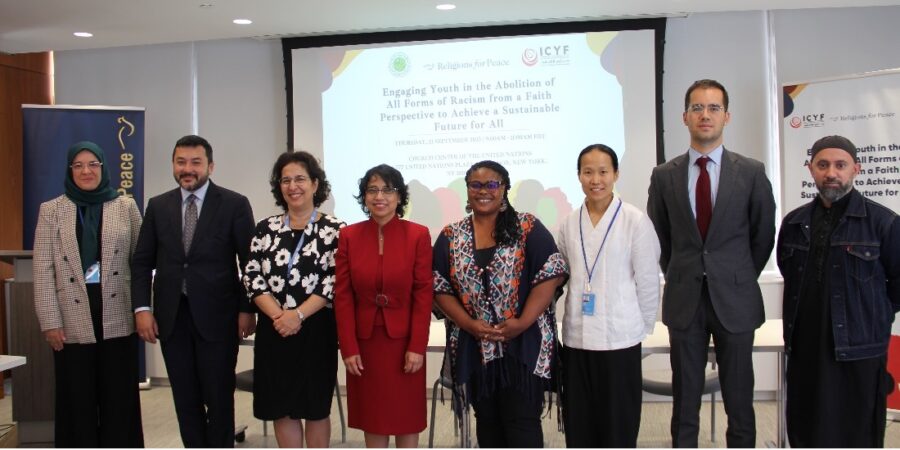
Special Guests and speakers included Ms. Deepika Singh, Associate Secretary General and Director of Programmes, Religions for Peace; H.E Dr. Taha Ayhan, President, Islamic Cooperation Youth Forum (ICYF); H.E Dr. Koutoub Mustapha Sano, Secretary General, International Fiqh Academy; Professor Nazila Ghanea, United Nations Special Rapporteur on Freedom of Religion or Belief; Imam Khalid Latif, University Chaplain, NYU, Executive Director, The Islamic Center at NYU, Senior Fellow & Co-Founder, Of Many Institute for Multifaith Leadership; Ms. Mirian Akuaba De-Souza, Religions for Peace International Youth Committee Member and Youth Representative, Ghana Conference of Religions for Peace; Mr. Pietro Bartoli, Director, Sant’Egidio Solidarity Project, New York City; and Mr. Christian Kazadi Lupemba, Chairperson, Religions for Peace Interfaith Youth Network, Democratic Republic of Congo, and Rev. Doyeon Park, Minister of the Manhattan Won Buddhist Temple and a Representative of Won Buddhism to the United Nations.
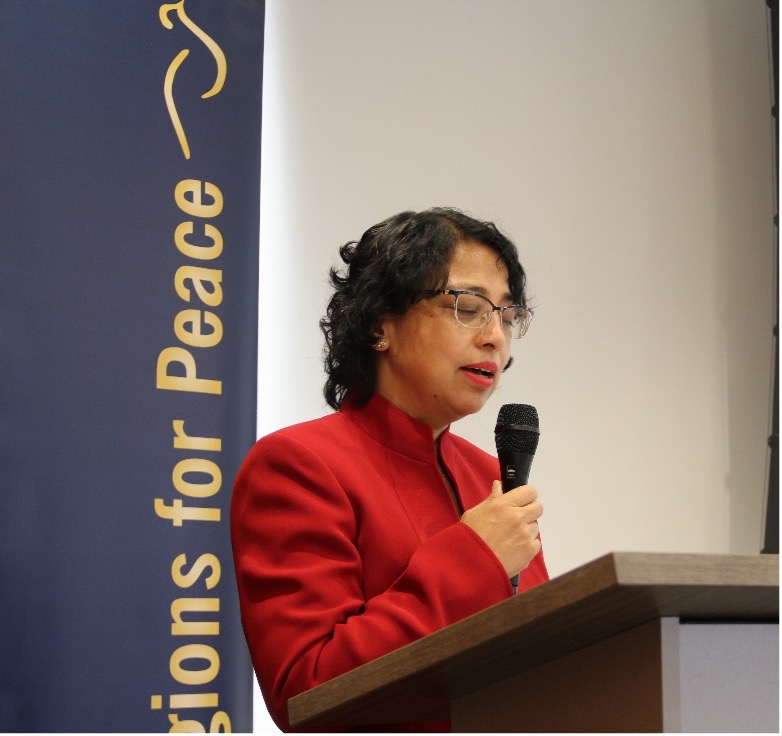 Ms. Deepika Singh’s opening remarks reminded us of the importance of continuing to work toward the SDG’s and, “… for us to also ensure that there is equality and justice for all, we must get rid of racism and discrimination in all its forms.” She continued by saying, “Even today, the pervasive effects of racism and slavery continues to hinder billions of people from enjoying their full rights and freedom. For over 52, Religions for Peace has been convening the world’s religious and Indigenous communities for multi-religious collaboration and action to protect human dignity and promote human flourishing that ensures that no one is left behind” Ms. Singh closed her remarks by stating that “together we can eliminate regressive views, change behaviours with a unified voice and action, and root out racism and racial discrimination with strong engagement, participation and the mobilisation of youth.”
Ms. Deepika Singh’s opening remarks reminded us of the importance of continuing to work toward the SDG’s and, “… for us to also ensure that there is equality and justice for all, we must get rid of racism and discrimination in all its forms.” She continued by saying, “Even today, the pervasive effects of racism and slavery continues to hinder billions of people from enjoying their full rights and freedom. For over 52, Religions for Peace has been convening the world’s religious and Indigenous communities for multi-religious collaboration and action to protect human dignity and promote human flourishing that ensures that no one is left behind” Ms. Singh closed her remarks by stating that “together we can eliminate regressive views, change behaviours with a unified voice and action, and root out racism and racial discrimination with strong engagement, participation and the mobilisation of youth.”
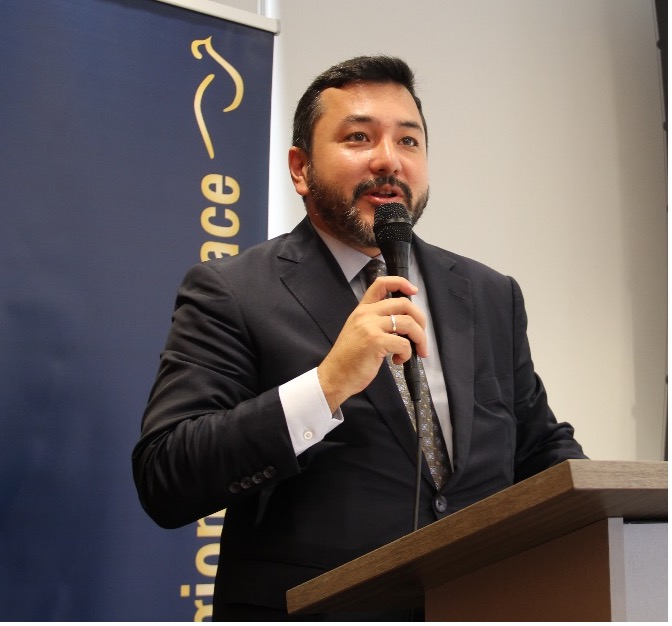 More opening remarks came from H.E Dr. Taha Ayhan who reiterated the importance of what the pandemic taught us about racism. “The COVID-19 pandemic has seen a surge in these [racist] attitudes, and we know that our youth must be the driving force behind positive change. We have seen that there is no way we can ignore or run away from racism, it is a reality and we have seen the remarkable effects of youth against racism as seen with the power of social media and the power of raising awareness.” Dr. Ayhan also stressed that young people are utilising social media platforms to educate and amplify their voices by sharing stories and mobilising support. He also reminded is that youth bring fresh perspectives to debates and development strategies and that racism is a problem of all of humanity, not just one ethnic or religious group.
More opening remarks came from H.E Dr. Taha Ayhan who reiterated the importance of what the pandemic taught us about racism. “The COVID-19 pandemic has seen a surge in these [racist] attitudes, and we know that our youth must be the driving force behind positive change. We have seen that there is no way we can ignore or run away from racism, it is a reality and we have seen the remarkable effects of youth against racism as seen with the power of social media and the power of raising awareness.” Dr. Ayhan also stressed that young people are utilising social media platforms to educate and amplify their voices by sharing stories and mobilising support. He also reminded is that youth bring fresh perspectives to debates and development strategies and that racism is a problem of all of humanity, not just one ethnic or religious group.
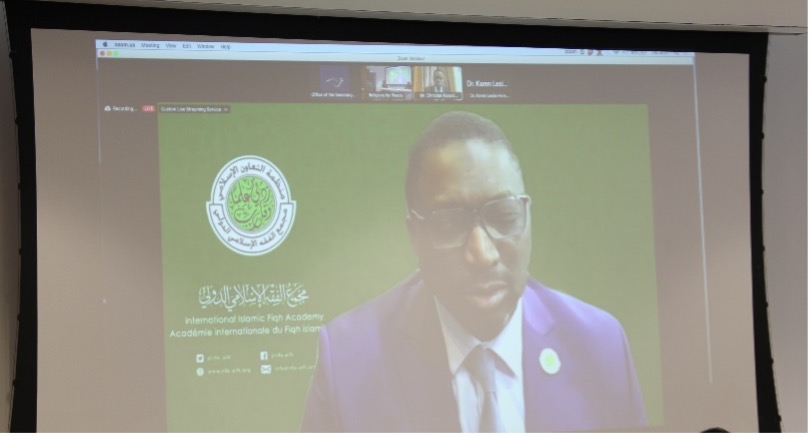 In his opening remarks, H.E Dr. Koutoub Mustapha Sano noted that ensuring youth be a part of this discussion is necessary and that we know that racism, especially from a religious perspective, have no place in our communities. Dr. Sano reminded us that, “…from day one, Muslims have been fighting against racism and discrimination, even back to the time of the Prophet Mohammed (PBUH).” He continued by stating, “Islam tells us that all people are equal, and any other views are fabricated. We need to work harder to denounce and reject racist beliefs in the name of religion and we must make sure that we are coordinating our efforts.”
In his opening remarks, H.E Dr. Koutoub Mustapha Sano noted that ensuring youth be a part of this discussion is necessary and that we know that racism, especially from a religious perspective, have no place in our communities. Dr. Sano reminded us that, “…from day one, Muslims have been fighting against racism and discrimination, even back to the time of the Prophet Mohammed (PBUH).” He continued by stating, “Islam tells us that all people are equal, and any other views are fabricated. We need to work harder to denounce and reject racist beliefs in the name of religion and we must make sure that we are coordinating our efforts.”
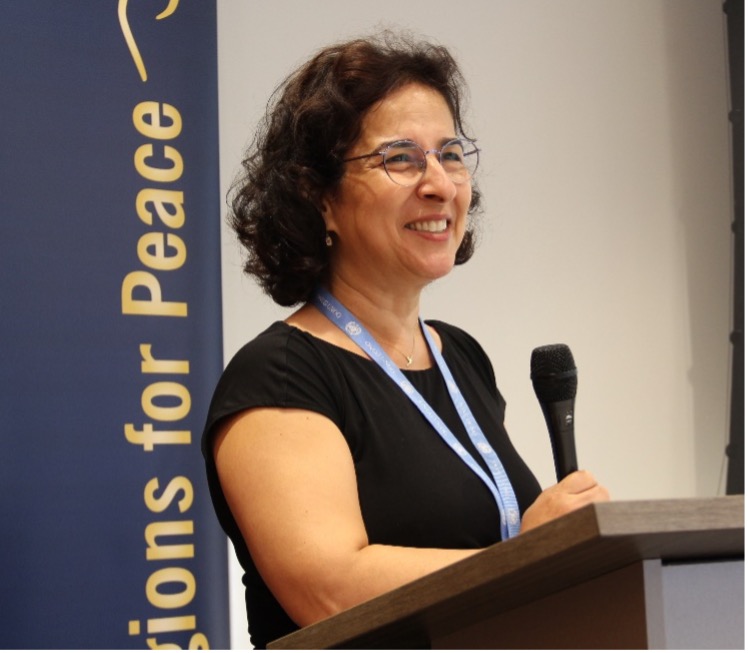 Guest Keynote Speaker, Prof. Nazila Ghanea shared key knowledge, speaking from her work at the United Nations and urged understanding that racism is an urgent issue for youth, especially, as they will endure the effects longer than we will. “If the SDG agenda is relevant to anyone, then of course it is most relevant to youth. Racism in all its forms, is devastating to most of the SDGs. For countering this, faith is one of the most powerful tools.” Sharing vital statistics, Prof. Ghanea reminded the audience that, “Since 2010, there have been dozens of communications concerned with freedom of religious beliefs and contemporary forms of racism as have there been joint intersectional U.N reports on these issues.” Speaking further, Prof. Ghanea said, “We need to protect the spheres within which people can talk about religion and their beliefs while at the same time being aware of those who use this space as a guise for fostering hatred. Quran burnings around the world recently have all been rooted in contexts of Islamophobia, to provoke hatred and sometimes violence. Resolution 16/18 has at the heart of it, “constitute a roadmap for domestic religious harmony and respect and inspired the faiths for rights framework.”
Guest Keynote Speaker, Prof. Nazila Ghanea shared key knowledge, speaking from her work at the United Nations and urged understanding that racism is an urgent issue for youth, especially, as they will endure the effects longer than we will. “If the SDG agenda is relevant to anyone, then of course it is most relevant to youth. Racism in all its forms, is devastating to most of the SDGs. For countering this, faith is one of the most powerful tools.” Sharing vital statistics, Prof. Ghanea reminded the audience that, “Since 2010, there have been dozens of communications concerned with freedom of religious beliefs and contemporary forms of racism as have there been joint intersectional U.N reports on these issues.” Speaking further, Prof. Ghanea said, “We need to protect the spheres within which people can talk about religion and their beliefs while at the same time being aware of those who use this space as a guise for fostering hatred. Quran burnings around the world recently have all been rooted in contexts of Islamophobia, to provoke hatred and sometimes violence. Resolution 16/18 has at the heart of it, “constitute a roadmap for domestic religious harmony and respect and inspired the faiths for rights framework.”
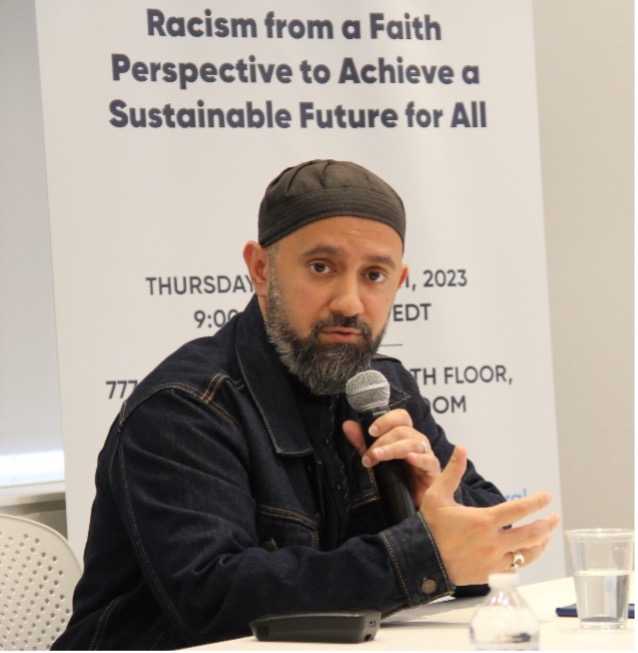 During the Youth Interactive Panel Discussion moderated by Rev. Doyeon Park, Imam Khalid Latif shared his indelible wisdom by stating that understanding how narrative is created is incredibly important especially when dealing with purposefully built-in structural inequalities. “We should elevate the discussion around racism to understand its structural roots. Organised evil will always triumph over unorganised good.” Imam Latif reminded the audience that systemic and structural mechanisms continue to allow those with power and privilege to retain that power and privilege at the expense of those underserved and underprivileged and that, “This narrative is not just invisible, it has been purposefully erased. Narratives of fear keep people paralysed and maintains an idea that it is the oppressed that are solely responsible for changing the system.”
During the Youth Interactive Panel Discussion moderated by Rev. Doyeon Park, Imam Khalid Latif shared his indelible wisdom by stating that understanding how narrative is created is incredibly important especially when dealing with purposefully built-in structural inequalities. “We should elevate the discussion around racism to understand its structural roots. Organised evil will always triumph over unorganised good.” Imam Latif reminded the audience that systemic and structural mechanisms continue to allow those with power and privilege to retain that power and privilege at the expense of those underserved and underprivileged and that, “This narrative is not just invisible, it has been purposefully erased. Narratives of fear keep people paralysed and maintains an idea that it is the oppressed that are solely responsible for changing the system.”
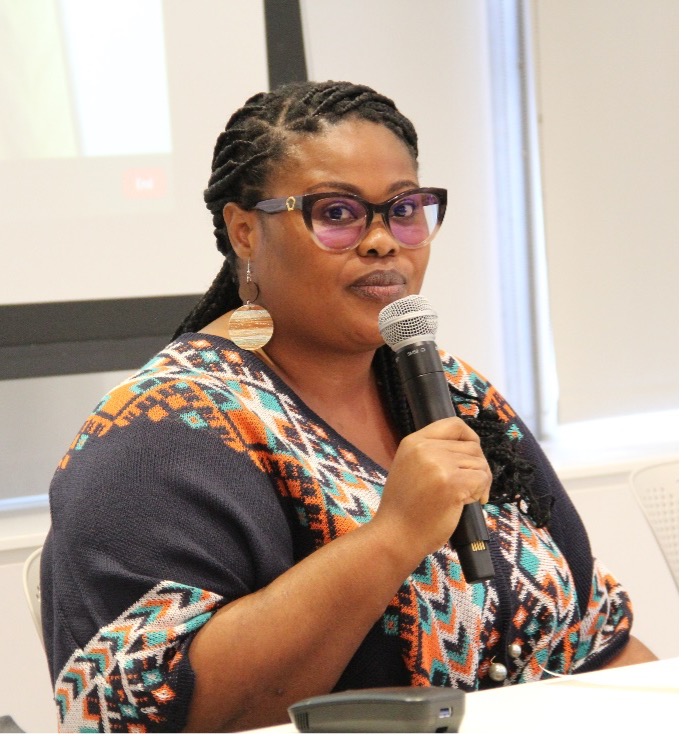 Ms. Mirian Akuaba De-Souza was called upon to speak of her experience in Ghana and she recalled that racism is also practiced and affected by the social conditions of the community. “In Ghana, there is so much unemployment, that it is not about how qualified you are for the job, it is about who you know and what tribe you are from. If you don’t belong to this particular tribe, you will not get a job.” Speaking of the realities of different religious groups in Ghana, she noted that Islamophobia is another big problem in Ghana, where Muslim students are being denied their right to fast, pray, go to school and wear their hijab. “It is sad and hard for the youth of Africa, especially from the marginalised communities. If you don’t have the right last name or know the right minister, you will not get a job.”
Ms. Mirian Akuaba De-Souza was called upon to speak of her experience in Ghana and she recalled that racism is also practiced and affected by the social conditions of the community. “In Ghana, there is so much unemployment, that it is not about how qualified you are for the job, it is about who you know and what tribe you are from. If you don’t belong to this particular tribe, you will not get a job.” Speaking of the realities of different religious groups in Ghana, she noted that Islamophobia is another big problem in Ghana, where Muslim students are being denied their right to fast, pray, go to school and wear their hijab. “It is sad and hard for the youth of Africa, especially from the marginalised communities. If you don’t have the right last name or know the right minister, you will not get a job.”
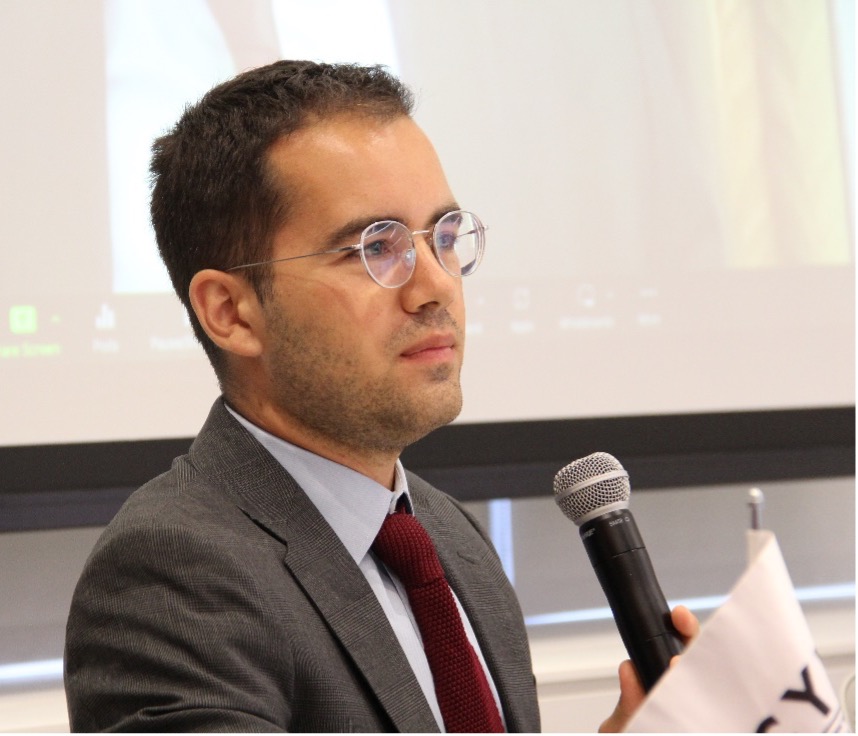 Speaking from his experience on housing the homeless, as well as a massive migrant influx into New York City, Mr. Pietro Bartoli shared about witnessing the many systems in place that exacerbate racist tendencies. “Across the board – local, city, county, state etc. – there are broad policies aimed at disenfranchising black and brown communities. Looking at the recent swell in migrants entering New York City, we have had over 100,000 people arrive, most of them have been put on buses against their will. We are a right-to-shelter city, which covers the recently arrived migrants as well. However, prior to these arrivals New York already had a 50,000 people strong homeless population and an over-burdened social service programme which has been de-prioritised and defunded making more people homeless.” Even with the dire conditions in New York City, racism exists within the homeless community itself. Mr. Bartoli went on to observe that in his encounters with homeless people in NYC, he meets many who are against the migrants saying, ‘We’re Americans, why do these people [recent migrants] get help and not us?’ He ended by stating that “It is the wilful ignorance of the suffering of many which encourages people to take their anger out on the closest people to them.”
Speaking from his experience on housing the homeless, as well as a massive migrant influx into New York City, Mr. Pietro Bartoli shared about witnessing the many systems in place that exacerbate racist tendencies. “Across the board – local, city, county, state etc. – there are broad policies aimed at disenfranchising black and brown communities. Looking at the recent swell in migrants entering New York City, we have had over 100,000 people arrive, most of them have been put on buses against their will. We are a right-to-shelter city, which covers the recently arrived migrants as well. However, prior to these arrivals New York already had a 50,000 people strong homeless population and an over-burdened social service programme which has been de-prioritised and defunded making more people homeless.” Even with the dire conditions in New York City, racism exists within the homeless community itself. Mr. Bartoli went on to observe that in his encounters with homeless people in NYC, he meets many who are against the migrants saying, ‘We’re Americans, why do these people [recent migrants] get help and not us?’ He ended by stating that “It is the wilful ignorance of the suffering of many which encourages people to take their anger out on the closest people to them.”
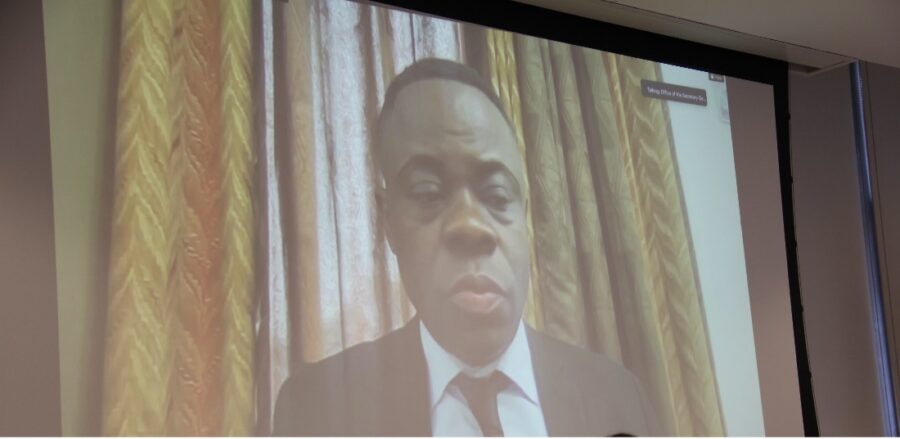 Speaking from the Democratic Republic of Congo, Mr. Christian Kazadi Lupemba engaged the audience from his own perspective as a young person who has grown up in a conflicted region. “Youth have unique perspectives and they bring new ideas leading to innovative solutions. Involving the youth in the decision-making process helps to address their specific needs and experiences. Meaningful youth engagement is important in the solution of racism.” He also offered some solutions to combating racism in that, “…it is crucial to equip them with comprehensive education which includes spiritual perspectives. Schools should integrate anti-racism curriculum into the regular curriculum, and we should establish training programmes aimed at teaching employees and employers about inclusivity and racism/employment discrimination – employment should not be an opportunity to make money on the backs of others, it should be an opportunity to give back to our society and community.”
Speaking from the Democratic Republic of Congo, Mr. Christian Kazadi Lupemba engaged the audience from his own perspective as a young person who has grown up in a conflicted region. “Youth have unique perspectives and they bring new ideas leading to innovative solutions. Involving the youth in the decision-making process helps to address their specific needs and experiences. Meaningful youth engagement is important in the solution of racism.” He also offered some solutions to combating racism in that, “…it is crucial to equip them with comprehensive education which includes spiritual perspectives. Schools should integrate anti-racism curriculum into the regular curriculum, and we should establish training programmes aimed at teaching employees and employers about inclusivity and racism/employment discrimination – employment should not be an opportunity to make money on the backs of others, it should be an opportunity to give back to our society and community.”
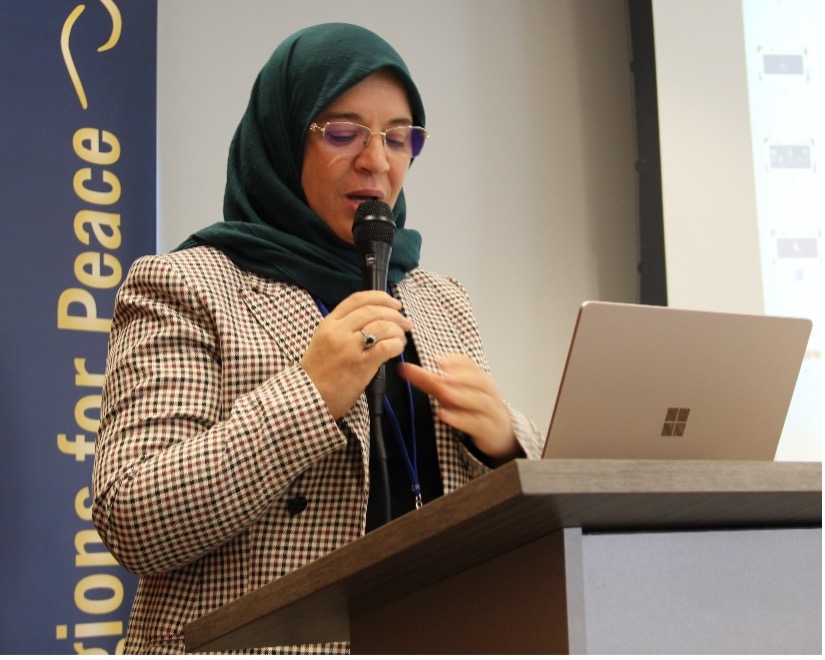 Finally, Dr. Fadila Grine offered a few closing remarks, citing the realities and the importance of this conversation. She warned that we must continue to talk about and to work to end racism in all its forms. She noted that this event aimed to shed light on the critical role of youth in combating racism, all while viewing this global issue through a lens of faith. “This event is not merely seen as a platform for dialogue and collaboration, but it also reiterates our collective commitment to building a world free from racism and dedication to sustainable development.”
Finally, Dr. Fadila Grine offered a few closing remarks, citing the realities and the importance of this conversation. She warned that we must continue to talk about and to work to end racism in all its forms. She noted that this event aimed to shed light on the critical role of youth in combating racism, all while viewing this global issue through a lens of faith. “This event is not merely seen as a platform for dialogue and collaboration, but it also reiterates our collective commitment to building a world free from racism and dedication to sustainable development.”
With several main objectives, this dynamic side event raised important and relevant awareness about the systemic nature of racism and its detrimental impact on youth and communities. By exploring the different manifestations of racism including discrimination, prejudice, Islamophobia, and violence, and their far-reaching consequences on marginalised youth and communities, this event emphasised the importance of engaging young people as powerful agents of change in combating racism and promoting shared values of diversity, equality, and justice. Also exemplified was the importance and value added of meaningful youth engagement, youth led campaigns, policy discussions, coalitions, publications, workshops, and collective efforts in combating racism effectively. While we all still have work to do, we are confident that with youth leading the way, we will soon see less systemic racism in our communities worldwide.